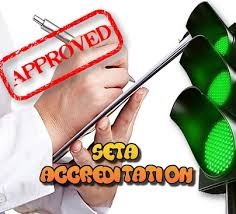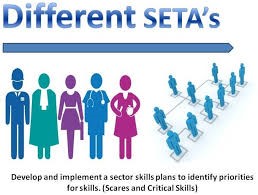Get to know the ins and outs of what Services SETA is all about
Want to know more about services seta (servicesseta)? BOTI offers business training programmes across South Africa. Book now!
Get to know the ins and outs of what Services SETA is all about
The General SETA landscape
What does SETA stand for?
In its basic terms, SETA stands for SECTOR Education and Training Authority which is a vocational skills training organisation in South Africa. There are currently 21 SETAs at this stage and each one is responsible within its own jurisdiction for the management and creation of learnerships, unit-based skills programmes, internships and apprenticeships. In South Africa, each and every industry and occupation is covered by one of the individual SETAs.
The establishment of SETA
It was in 1996 that experts came to the conclusion that South Africa nothing short of a skills revolution in order to survive a highly competitive global marketplace. Hence, in 1998 Parliament ratified the Skills Development Act. The act defined a new Sector Training and Education Authority (SETA) system.
In April 2010, South Africa’s Higher Education and Training Minister gave a statement which involved the public release of the proposed new landscape of what the SETA should look like. In terms of this proposed new landscape the then current 23 SETAs were reduced to 21 SETAs.
Want to know more about services seta (servicesseta)? BOTI offers business training programmes across South Africa. Book now!
In business, rules, laws and regulations are often confusing. Get to know more about the Labour Relations Act. Book now!
Human Resources Management and Labour Relations Course
Services Sector Education and Training Authority (Services SETA)
In March 2000, the Services Sector Education and Training Authority (Services SETA) was established and registered in terms of the skills development Act of 1998.
Services SETA is responsible for the disbursement of the training levies payable by all employers in South Africa which are collected by the South African Revenue Service (SARS) via the Department of Higher Education and Training (DHET), and are disbursed through a management system motivated by skills requirement assessment and monitoring.
The Services SETA ensures that the skill requirements of the services sector are identified and that adequate and appropriate skills are readily available. Through achieving a more favourable balance between demand and supply, the Services SETA contributes to the improvement of sector skills and ensures that education and training:
- Is provided subject to validation and quality assurance
- Meets agreed standards within a national framework
- Ensures that new entrants to the labour market are adequately trained
- Acknowledges and enhances the skills of the current work force.
Want to know more about services seta (servicesseta)? BOTI offers business training programmes across South Africa. Book now!
Services SETA Vision, Mission and Values
Vision
To serve, to deliver, for renewal, for prosperity.
Mission
Facilitation of quality skills development for employment and entrepreneurship in the Services Sector for national economic growth.
Values
- Accountability
• Innovation
• Integrity
• Professionalism
• Responsiveness
In business, rules, laws and regulations are often confusing. Get to know more about the Labour Relations Act. Book now!
Labour Relations & Law Fundamental Training Course
SETA Training
From our understanding of the description previously outlined, SETA stands for Sector Education and Training Authority and a SETA is therefore a body that is responsible for overseeing skills development and training within a particular industry sector.
Different SETAs were established for the different industry sectors in terms of the Skills Development Act 97 of 1998. A SETA can also be accredited by the South African Qualifications Authority (SAQA) as an Education and Training Quality Assurance body (ETQA), which allows the SETA to accredit training providers that provide education and training in its sector.
Want to know more about services seta (servicesseta)? BOTI offers business training programmes across South Africa. Book now!
The role of a SETA in a nutshell with respect to training
A SETA’s primary role is to improve and develop skills within its sector, to identify skills development needs, and to ensure that national standards are maintained. In order to achieve this goal, a SETA will develop and implement a sector specific skills plan, and will monitor education and training within that sector.
Once a SETA has been accredited by SAQA as an ETQA, it also evaluates and accredits training providers within its sector.
SETAs are also responsible for the following tasks:
- Administer the funds that are collected in terms of the Skills Development Levy
- Promote the creation of learnerships within the relevant sector
- Perform quality assurance functions in order to ensure that the applicable standards are being maintained
- Aim to ensure that learners and members of the workforce have the skills that are required by the relevant industry sectors.
Detailed description of the various functions of SETAs
- The development of a sector skills plan to describe the trends in each sector, the skills that are in demand and to identify priorities for skills development.
- Implement the plan.
- Develop and administer learnerships, which include the traditional apprenticeships of the past, and combine practice and theory. However, learnerships go beyond ‘blue-collar” trades — they also prepare people for jobs in the new services sector and for higher para-professional occupations.
- Support the implementation of the National Qualifications Framework, on which any qualification or learning outcome can be registered.
- Undertake quality assurance. In promoting quality provision, SETAs accredit education and training providers, monitor provision to ensure that programmes are being followed, register assessors, collaborate with other education and training quality (ETQ) assurers, report to the South African Qualifications Authority on how they fulfil the ETQ role and disburse levies collected from employers in their sector. Employers pay 1% of their salary payroll to the South African Revenue Services (SARS) on a monthly basis. The SETA uses 10% of the money to cover administration costs. Approximately 70% can be claimed back by companies. The remaining 20% goes to the national skills fund.
- Report to the minister and the South African Qualifications Authority. SETAs are statutory bodies. This means that they are established by Act of Parliament and are given clear responsibilities to be discharged in the public interest. The levy collected from employers is public money. The director general of the Department of Labour is the accounting officer. SETAs must, therefore, report to the director general on the efficient and effective use of funds.
- SETAs are also governed by the Public Finance Management Act, the provisions of which are designed to ensure that public bodies operate in a manner that is not wasteful or irresponsible. To make SETAs publicly accountable, and to give them the full responsibility and scope to organise their work, each SETA is required to enter into a Service Level Agreement (SLA) with the Department of Labour.
- Each SETA must draw up a sector skills plan (SSP), which is important when making decisions about the priorities for skills development. The SSP provides the framework and background for the SETA’s actions.
In business, rules, laws and regulations are often confusing. Get to know more about South African labour law. Book now!
Want to know more about services seta (servicesseta)? BOTI offers business training programmes across South Africa. Book now!
SETA accreditation
According to the South African Qualifications Authority (SAQA), accreditation means that a person, a body or an institution has been certified as “having the capacity to fulfill a particular function in the quality assurance system set up by the South African Qualifications Authority.”
SETA accreditation can only be attained by a training provider if the training provider successfully completes the stringent application process prescribed by the relevant SETA. SETA accreditation is therefore the result of a process whereby a SETA determines whether a training provider has the necessary capacity and ability to provide quality training in line with National Qualifications Framework (NQF) standards.
The purpose of SETA Accreditation
The purpose of SETA accreditation is to ensure that education and training is of a high standard and quality and that it is relevant to the needs of the industry sector in question. If a training provider has SETA accreditation, it means that the training provider’s courses comply with the NQF standards and that the courses offered have been evaluated to ensure that they are in line with these standards.
Want to know more about services seta (servicesseta)? BOTI offers business training programmes across South Africa. Book now!
Uniformity of training
SETA accreditation also aims to ensure that there is uniformity of similar courses offered by different training providers. SETA accreditation therefore provides the assurance that a training provider will be capable of providing relevant training and education that is in line with national standards. Another purpose of SETA accreditation is to ensure that the courses being offered by accredited training providers are relevant to industry needs and will equip students with the skills required in the workplace.
Benefits of SETA accreditation to students
If a student completes a SETA accredited course through a training provider that has SETA accreditation, the student can earn the appropriate NQF credits. NQF credits can count towards full qualifications that are recognised throughout South Africa. In other words, SETA accreditation means that a course or qualification can be formally recognised. This is of benefit to the student, as employers in certain sectors often require their employees to be in possession of formal qualifications. Formal recognition is also beneficial to students who wish to change from one course to another without having to repeat subjects or courses that they may already have completed.
SETA accreditation is also an indication to students that a training provider is reputable, and not a fly-by-night institution. Another benefit of SETA accreditation is that it assures students that they will be receiving training that they will be able to apply in the workplace and that they will be equipped with skills that are sought after by employers within the particular industry sector.
SETA accreditation process
How the SETA accreditation process works
Each SETA is responsible for the accreditation of training providers within its own industry sector, and as a consequence sets out its own accreditation process which needs to be followed.
Nevertheless, the processes for the different SETAs are fairly similar. The first step in the accreditation process would be for a training provider to determine which SETA’s accreditation it requires which will depend on the training provider’s primary focus, in other words which sector its courses predominantly fall under.
As an example, if a training provider wants to be accredited as a training provider for SETA accredited accounting courses, it should apply to FASSET, which is the SETA for Finance, Accounting, Management Consulting and other Financial Services. Training providers can only apply for SETA accreditation of unit standards (modules) or qualifications that are registered on the National Qualifications Framework (NQF).
Once a training provider has determined which SETA’s accreditation it requires, it should consult the relevant SETA in order to establish the specific application requirements and what steps need to be followed. The process usually involves the submission of an application form along with a comprehensive set of supporting documents. The next step involves the SETA going through the necessary evaluation process in terms of the application and carrying out a site evaluation in order to determine whether the training provider meets all the necessary requirements. Should the training provider meet the necessary requirements, it will be accredited. Should the training provider not pass the evaluation, it may be given a time period in which to take remedial action. Should such remedial action be taken within the allowed time period, accreditation may be granted, otherwise the provider will need to re-apply. The application process can take up to approximately 10 weeks to complete.
Want to know more about services seta (servicesseta)? BOTI offers business training programmes across South Africa. Book now!
Different types of accreditation processes
Services SETA accreditation process
- The Services SETA only accepts online applications.
- The training provider will need to prepare all the required documents and complete an application form and then submit such to the Services SETA electronically.
- Once the Services SETA has received the application, it will do a compliance check to make sure that all the necessary requirements have been met, and if it finds that the training provider complies with such requirements, it will conduct a site evaluation of the training provider.
- The training provider will then be notified of the outcome of the evaluation process, and may in certain circumstances be required to take remedial action in order to ensure that it measures up to the required standards before accreditation will be granted.
The FASSET accreditation process
- The training provider is required to submit the completed application form and all the relevant attachments to FASSET.
- FASSET will then perform an internal evaluation of the application, which it is estimated can take between 6 to 8 weeks to complete.
- Should the training provider pass the evaluation accreditation will be granted.
- FASSET takes a developmental approach to its evaluation, which means that a training provider will be given 6 months in which to remedy any shortcomings which may have been established during the evaluation. If such shortcomings are satisfactorily remedied within the 6 months period the provider will be accredited. Should this not be the case the training provider may re-apply.
General requirements for SETA accreditation
- The training provider should be properly registered in terms of applicable legislation.
- The training provider must have a Quality Management System (QMS) in place. In its application guidelines, FASSET defines a QMS as “the combination of processes used to ensure that the degree of excellence specified is achieved.” A QMS consists of the policies and procedures that determine how the training provider ensures the quality of its training.
- The training material must be aligned with the unit standards on the National Qualifications Framework (NQF).
- The training provider must have assessors and moderators that are properly registered to do assessment and moderation of the unit standards that are to be accredited.
- The different SETAs may have their own accreditation requirements in addition to the general requirements listed above. These additional requirements can be found on the relevant SETA’s website, or can be obtained by contacting the SETA in question.
The SETA accreditation requirements set a high standard with which training providers must comply. This is to ensure that a high standard of education and training will be maintained nationally, and that students are equipped with relevant skills. In order to comply with the accreditation requirements, a training provider has to be well organised and should have all the necessary documentation, policies and procedures in place. This means that great value is attached to having SETA accreditation, and SETA accredited training is therefore in high demand.
Comprehensive list of SETAS in South Africa
| AgriSETA | Agricultural Sector Education and Training Authority |
| BANKSETA | Banking Sector Education and Training Authority |
| CETA | Construction Education and Training Authority |
| CHIETA | Chemical Industries Sector Education and Training Authority |
| CTFL | Clothing, Textiles, Footwear and Leather Sector Education and Training Authority |
| ESETA | Energy Sector Education and Training Authority |
| ETDP | Education, Training and Development Practices Sector Education and Training Authority |
| FASSET | Financial and Accounting Services Sector Education and Training Authority |
| FIETA | Forest Industry Sector Education and Training Authority |
| FOODBEV | Food and Beverage Manufacturing Industry Sector Education and Training Authority |
| FP&MSETA | Fibre Processing and Manufacturing Sector Education and Training Authority |
| HWSETA | Health and Welfare Sector Education and Training Authority |
| INSETA | Insurance Sector Education and Training Authority |
| ISETT | Information Systems, Electronics and Telecommunications Technologies Sector Education and Training Authority |
| LGSETA | Local Government Sector Education and Training Authority |
| MERSETA | Manufacturing, Engineering and Related Services Sector Education and Training Authority |
| MICT | Media, Information and Communication Technologies Sector Education and Training Authority |
| MQA | Mining Qualifications Authority |
| PSETA | Public Service Sector Education and Training Authority |
| SASSETA | Safety and Security Sector Education and Training Authority |
| SERVICES SETA | Services Sector Education and Training Authority |
| TETA | Transport Sector Education and Training Authority |
| W&RSETA | Wholesale and Retail Sector Education and Training Authority |
Contact details for each SETA in South Africa
- Bankseta — Banking Seta Tel: (011) 805 9661, Fax: (011) PO Box 11678, Vorna Valley, 1686 Block 6, Thornhill Office Park, 94 Bekker Road, Midrand Website: www.bankseta.org.za
- Chieta — Chemical Industries Education and Training Authority Tel: (011) 726 4026, Fax: (011) 726 7777 PO Box 961, Auckland Park, 2006 No 2 Clamart Road, Richmond, Johannesburg Website: www.chieta.org.za
- Ceta — Construction Education and Training Authority Tel: (011) 265 5915 Fax: (011) 265 5924/5925 or 312 1747 Box 1955, Halfway House, 1685 2nd Floor, Unit 5, Momentum Business Park, Main Road, Midrand Website: www.ceta.org.za
- Didteta — Diplomacy, Intelligence, Defence, and Trade and Industry Seta Tel: (012) 663 6983, Fax: (012) 663 4878 PO Box 11210, Centurion, 0046 Die Anker Building, Room 404, 1279 Mike Crawford Avenue, Centurion Website: www.didteta.co.za
- Eseta — Energy Seta Tel: (011) 838 0117, Fax: (011) 838 0119 PO Box 5983, Johannesburg, 2001 35 Prichard Street, 1066 Building, 19th Floor, Johannesburg
- ETDP Seta — Education, Training and Development Practices Seta Tel: (011) 517 3720, Fax: (011) 807 5621 Email: [email protected] PO Box 5734, Rivovia, 2128 Tuscany Office Park, Building 10, Coombe Palce, Rivonia
- Fasset — Financial and Accounting Services Tel: (011) 476 8570, Fax: (011) 476 5756 PO Box 6801, Cresta, 2118 Block A, 306 3rd Floor, Eva Office Park, corner of Beyers Naude and Judges Avenue, Blackheath, Johannesburg Website: www.fasset.org.za
- Fieta — Forest Industries Seta Tel: (011) 712 0600, Fax: (011) 712 0601 Box 31276, Braamfontein, 2017 7th Floor, Rennies House, 19 Ameshoff Street, Braamfontein Website: www.fieta.org.za
- Foodbev — Food and Beverages Manufacturing Industry Seta Tel: (011) 802 1211, Fax: (011) 802 1518 E-mail: PO Box 245, Gallo Manor, 2052 The Woodlands, Building 23, 2nd Floor, Woodlands Drive, and Western Services Road, Woodmead
- HWSETA — Health and Welfare Seta Tel: (011) 622 6852, Fax: (011) 616 8939 P/Bag X15, Gardenview, 2047 10 Bradford Road, Bedfordview
- ISETT — Information Systems, Electronics and Telecommunications Technologies Tel: (011) 805 5115 Fax: (011) 805 6833 PO Box 5585 Halfway House 1685 Gallagher House, West Wing, 3rd Level, Block 2, Halfway House, Midrand Website: www.isett.org.za
- Inseta — Insurance Seta Tel: (011) 484 0722, Fax: (011) 484 0862 PO Box 32035, Braamfontein, 2017 Oakhurst, 11 St Andrews Road, Parktown
- LGWSETA — Local Government, Water and Related Services Seta Tel: (011) 456 8579, Fax: (011) 450 4948 E-mail: PO Box 1964, Bedfordview, 2008 20 Skeen Boulevard, Bedfordview
- Mappp — Media, Advertising, Publishing, Printing and Packaging Tel: (021) 949 1463, Fax: (021) 949 1468 PO Box 2847, Bellville, 7530 101 Voortrekker Road, Bellville
- Merseta — Manufacturing, Engineering and Related Seta Tel: (011) 492 1533, Fax: (011) 492 1542 PO Box 61826, Marshalltown, 2107 Metal Industries House, 6th Floor, 42 Anderson Street, Johannesburg
- MQA — Mining Qualifications Authority Tel: (011) 403 7946, Fax: (011) 403 8424 Private Bag X66, Braamfontein, 2017 33 Hoofd Street, 4th Floor, Forum 2, Braampark, Braamfontein
- PAETA — Primary Agriculture Education and Training Authority Tel: (012) 325 1655, Fax: (012) 325 1677 PO Box 26024, Arcadia, 0007 2nd Floor, Potato House, 529 Belvedere Street, Arcadia, Pretoria
- Poslec — Police, Private Security, Legal and Correctional Services Tel: (011) 805 0084, Fax: (011) 805 6630 PO Box 7612, Halfway House, 1685 19 Richards Drive, 3rd Level East Gallagher House, Gallagher Estate, Midrand Website: www.poslecseta.org.za
- PSETA — Public Services Seta Tel: (012) 314 7208, Fax: (012) 323 2386 E-mail: Private Bag X 916, Pretoria, 0001 Transvaal House, corner of Vermeulen and Van der Walt streets, Pretoria
- Services — Services Seta Tel: (011) 715 1800 Toll-free call centre: 0861 10 1148 Fax: (011) 726 4416 E-mail: PO Box 3322, Houghton, 2040 14 Sherbourne Road, Parktown Website: www.serviceseta.org.za
- Setasa — Secondary Agriculture Seta Tel: (012) 365 2827, Fax: (012) 348 1445 E-mail: [email protected] Private Bag X20003, Garsfontein, 0042 91 Glenwood Road, Lynnwood Glen, Pretoria Website: www.setasa.co.za
- Teta — Transport Education and Training Authority Tel: (011) 781 1280, Fax: (011) 781 0200 E-mail: PO Box 1283, Joubert Park, 2044 P/Bag X10016, Randburg, 2125 2nd Floor, 344 Pretorius Street, Randburg
- Textiles — Clothing, Textiles, Footwear and Leather Seta Tel: (031) 702 4482, Fax: (031) 702 4113 PO Box 935, Pinetown, 3600 3rd floor, Umdoni Centre, 28 Crompton Street, Pinetown
- Theta — Tourism and Hospitality Education and Training Authority Tel: (011) 803 6010, Fax: (011) 803 6702 PO Box 1329, Rivonia, 2128 HITB 38, Homestead Road, Rivonia Website: www.theta.org.za
- W&RSETA — Wholesale and Retail Seta Tel: (012) 452 9200, Fax: (012) 452 9229 E-mail: PO Box 2176, Brooklyn, 0075 Deloitte & Touche Brooklyn House 315 Bronkhorst Street, Brooklyn, Pretoria Website: www.wrseta.org.za
BOTI is accredited with both the Service Seta
[insert page=’services-seta-accreditation’ display=’content’]BOTI is accredited with the MICT Seta
[insert page=’seta-accreditation’ display=’content’]




